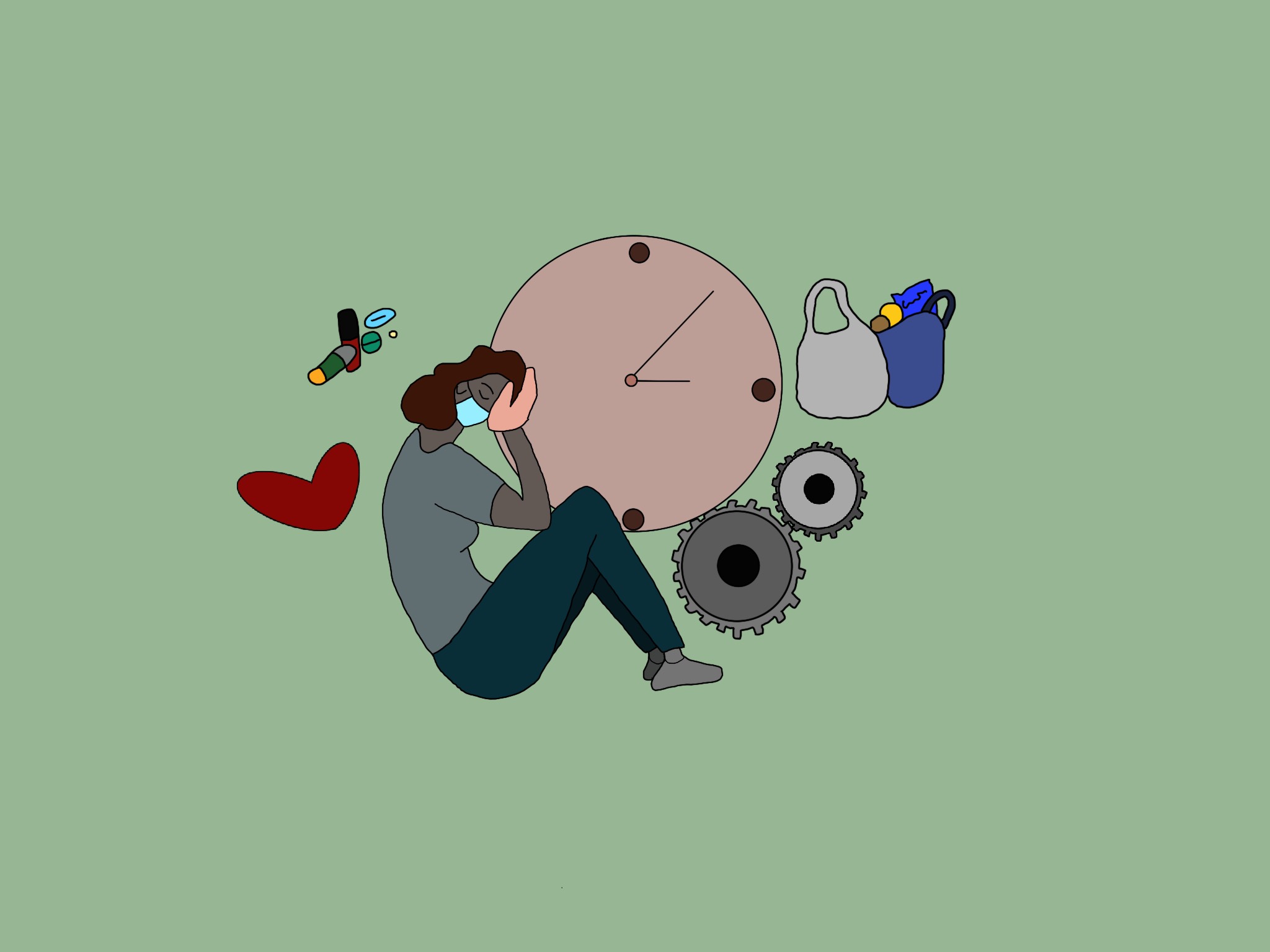For about two years, my grandmother has had severe mobility issues due to osteoarthritis. Her condition worsened further when her cognitive abilities became muddy. Her routine became the pivot around which all my plans revolved. I used to get tired, but I got used to it.
On the eve of college reopening this year – online, of course – my father suffered a stroke. Meanwhile, my grandmother got more ill. Three months passed and then the second-wave of COVID-19 struck with unimaginable might, leaving our country gasping for air. The virus’s fangs didn’t escape my house either – my mother and granduncle, like many, became faceless numbers in the active cases tally.
Needless to say, this year is pushing many to their limits. I would have never imagined soldiering on in these circumstances. People are serendipitously discovering inner strength. People are relentlessly fighting to stay alive.
While caring for the patients at home, I became well acquainted with caregiver burnout. It is a frequent and tiresome visitor. With my plate full, I haven’t had the time to implement the well-intended advice I always hear: “Take care of yourself too! If you fall sick, can you help others?”
My disarrayed sleeping patterns, diminished appetite and constant anxiety is defeating in spite of all the support I have.
Caring for my grandmother has always been difficult, but I have never felt so powerless. The fact that more people in my family are ill is a part of it. But, there is more to it.
A 2019 study by HelpAge India on the role of family in caregiving found that 29% of the respondents felt that caregiving was a burden. About 15% of them reported feeling severely burnt-out. I was curious to know the numerical picture for caregiver burnout during the pandemic.
There aren’t any COVID-specific statistics about caregiving stress in the Indian context. Then, it struck me that we don’t need one. The active cases toll is reflective enough. Each number in that tally we’re so used to seeing represents not only a patient but also the toil of many caregivers. After all, the scope of caregiving has widened tremendously. It is no longer just about the families of the sick and the elderly. It is about almost everyone, it seems. Everyone is vulnerable to this virus in some way or the other.
Caregivers work round the clock, and this endless carousel can be exhausting. The burnout can manifest in many ways, such as overwhelming fatigue, the inability to enjoy activities that were once pleasurable, disordered appetite and neglect of one’s own physical and mental health.
Guilt is something I personally experience, especially when I feel like I’m about to break down. Recurring thoughts like “I shouldn’t feel stressed, I’m doing my duty” or “there are so many people who don’t have the financial or emotional support I have, so I cannot feel this way” invalidate my anxiety. Guilt sets in when I’m taking a break as well.
On the other hand, there’s also resentment. There are times when I feel like I don’t have the luxury of carefree abandon I deserve. In very difficult moments, my sister not being here to share the load bothers me. These are my weak moments and I’m not proud of them.
Also read: Stolen Memories: Alzheimer’s and My Grandma
It has also been found that caregivers feel trapped. Caregiving is a series of routine chores. It is a stifling situation at the best of times. But now, there are constant updates flooding in from everywhere about our failing healthcare system and overcrowded cremation grounds. The nightmare seems endless. It has been more than a year. Is there a way out?
There doesn’t seem to be one now. My family isn’t out of the woods. The record high cases and the immense grief is painful to watch. But I keep telling myself that this cannot go on forever. No matter how many voices in my head rattle me with scary images of spinning endlessly in this whirlwind, I have to muster the courage to silence them.
It is not easy at all. Self-care takes time, which no one has right now. Notwithstanding how frustrating it can be to hear the seemingly simplistic advice about self-care, ideally it should be a priority. My concerned loved ones do have a point – it is futile to care for other people at the cost of my own wellbeing.
I don’t have anything ground-breaking to offer to the caregivers reading this. We are in a terrifying situation with so many things beyond our control. Any and every piece of advice sounds superfluous. However, I do believe that striding through these difficult times alone is a mistake we all make.
Emotional upheavals can make people feel alienated. It is very easy to dismiss everyday stressors as trivial. It is easy to slip into patterns of coping alone. It is something I tend to do a lot. But, I have learnt and re-learnt one lesson the very hard way – venting helps.
Something as simple as letting myself cry when I’m flustered, or sending a text to someone about a particularly difficult day helps. It doesn’t solve anything, and oftentimes people will not have words which are comforting enough. But voicing it lightens the burden, minuscule as the difference may seem.
It is also about realising that feeling overworked is completely justified. Feeling terribly alone in spite of support is also justified. Taking care of people when the future seems bleak is physically and emotionally taxing. So, there needn’t be pressure to be optimistic and grateful every minute of every day.
Most importantly, it is about remembering that this isn’t permanent – confining and endless as it seems.
This too shall pass.
§
Some verified resources for mental health support:
Pro-bono counselling
NIMHANS toll-free number
080-46110007
Affordable counselling:
Crowdsourced databases:
Free peer support/short-term support:
Shashwathi Sudhakar is a humanities student at Azim Premji University.
Featured image credit: Pariplab Chakraborty

